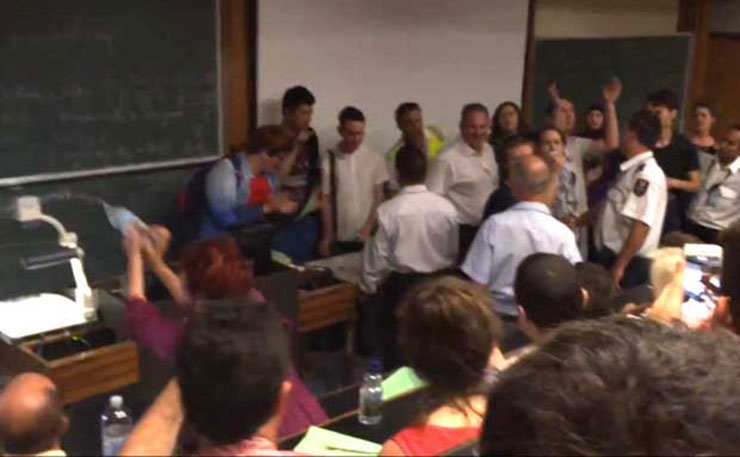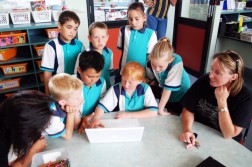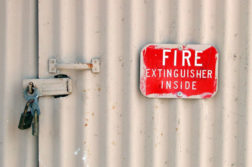An investigation into a protest at the University of Sydney is provoking growing dissatisfaction outside of the campus, with the university facing accusations it has imperilled free speech and the right to protest.
The NSW Council for Civil Liberties has weighed into the dispute, with President Stephen Blanks criticising the use of force on protesters and subsequent investigation into students and staff, which could see them dismissed.
As New Matilda revealed earlier in the week, Associate-Professor Jake Lynch and at least three of the five students being investigated are facing serious disciplinary action despite the fact they are facing seemingly minor allegations
The investigation was sparked after a lecture being delivered by retired British Colonel Richard Kemp – a prominent defender of Israeli military attacks on Gaza – was interrupted by students and other pro-Palestinian protesters.
Blanks said the university’s response raised serious questions about the limits of protest rights on campus, as well as freedom of expression.
“We think it’s an issue about the clash between the right to protest, which is a right which is traditionally able to be exercised on a university campus, and a code of conduct which the university is invoking to attempt to discipline staff and students,” Blanks said.
Letters from the university to the students being investigated revealed they are accused of swearing, pointing, telling members of the audience they were supporting genocide, and resisting removal from the lecture by security.
Lynch was initially accused of making anti-Semitic comments but was cleared of the allegations by the university’s initial investigation.
Despite that, he was included in a group of 11 students, staff, and off-campus figures sent letters requiring participation in the next round of the investigation.
Blanks said the incident drew attention to problems with the university’s Code of Conduct, which he described as “terribly vague”.
“The Code of Conduct has in it an obligation on staff to treat people with respect and dignity,” he said.
“That of course is fine in academic discourse but in the context of a protest it’s completely inappropriate. The essence of protest is that one can be contemptuous of those with whom you disagree and you don’t need to treat them with respect.”
“That’s not to say that there’s any justification for breaches of the peace, but that’s not the allegation here.”
Fahad Ali, a student of Palestinian background being investigated for his role in the protest, told New Matilda earlier in the week he did not believe the investigation had been in line with those after other protests on campus, and that the university had not responded to accusations of Islamophobia on campus with equal gusto.
“I think on the whole these are minor allegations and usually these would not hold any serious weight. But I think in the course of this investigation they have been blown up and they will be dealt with as serious, even though they are not,” he said.
Blanks will represent the Council for Civil Liberties at a Wednesday event organised to support the staff and students facing disciplinary action. The event will also be addressed by Greens Senator Lee Rhiannon.
Along with the group of 11 sent letters earlier this month, two security guards are reportedly being investigated after complaints about their handling of the protest were made to the university.
Video from the event shows students dropping to the floor and holding on to doorways as security drag them out of the room.
“I really question whether the use of force and the kind of force that the security guards apparently used in this situation is an appropriate response to what is just speech,” Blanks said.
In response to Blanks’ comments, a spokesperson for the University of Sydney offered the following statement.
“We are surprised that on the basis of no evidence the NSW Council for Civil Liberties would express opinions on individual behaviours at an event that is being thoroughly investigated.”
Asked whether the protesters interruption of the lecture was not itself an attack on free speech, Blanks said: “that can be argued, but the fact that some speech is so controversial that it gets interrupted is just an aspect of a free debate”.
He said other techniques could have been used to deal with the interruption rather than force.
University of Sydney Vice-Chancellor Michael Spence issued a general statement about the university’s response to the protest earlier in the month, emphasising his desire to balance freedom of expression and the right to protest on campus.
“In order to play this role, universities must also remain places where disagreements are courteous and respectful, and those who protest must respect the academic freedom of others to their point of view,” he was quoted as saying.
“We must remain an institution where discourse is civil, even if opinions are strongly held and strongly expressed.”
Donate To New Matilda
New Matilda is a small, independent media outlet. We survive through reader contributions, and never losing a lawsuit. If you got something from this article, giving something back helps us to continue speaking truth to power. Every little bit counts.




